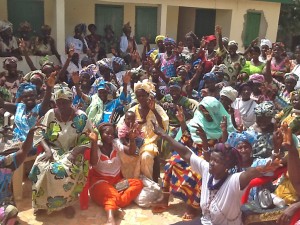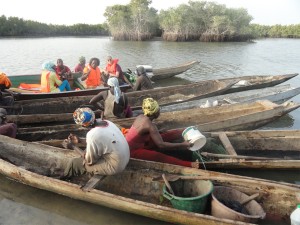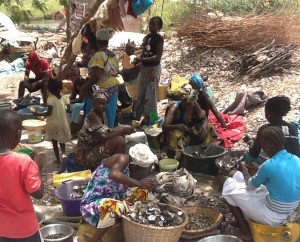
One day in The Gambia in 2007, Fatou Janha stopped to buy oysters from a woman along the roadside, something Janha had been doing since she was a child. On this particular day, however, something struck her for the first time. “I realized that these women were still working under the same conditions, with no improvement in their livelihood,” she recalled. “I wanted to help them.”
Such arduous work in the tiny West African nation is primarily the domain of uneducated village women who eke out a precarious living harvesting, processing and selling the crucial food source. To help them, Janha helped organize an initial group of 40 women into a collective, the TRY Oyster Women’s Association, of which she is executive director. The cooperative chose that name because the women decided to come together to “try” to improve their lives and the lives of their families and communities, she said.
“They are the poorest of the poor in The Gambia. They work from six in the morning until eight at night. They are the breadwinners for their families,” Janha told an audience at The Woodrow Wilson International Center for Scholars in Washington, D.C., in July 2013 She was invited to tell the story of the oyster women as part of the panel, “Oysters, Octopus and Resilience,” presented through the center’s Environmental Change and Security Program.
Every day, this once-disenfranchised group of women writes a new chapter in that story—one of empowerment, education and ecosystems—as they continue to improve their lives and set precedents.

A notable precedent came in 2012 when the government of The Gambia granted TRY exclusive use rights through a fisheries co-management plan for the cockle and oyster grounds in the Tanbi wetlands.
TRY is the first women’s group in Africa granted such rights by a national government, and the importance cannot be overstated, Janha said.
Those rights include responsibility for sustainable management, and one measure agreed upon by TRY members is an eight-month closure of the grounds to prevent overfishing and to protect the mangrove habitats that are crucial to the shellfish’s survival and to the coastal ecosystem. In June 2013, the women voted to uphold the fishery closure period despite pressure from some in the community to change its timing and reduce its duration to limit its impact on peak-sales seasons.
The women’s historic accomplishments were showcased on a global platform in 2012. when the association won an Equator Prize at the 2012 Rio+20 Summit. More than 125 projects competed for the United Nations Development Program honors.
CRC’s role
Today, TRY’s membership numbers more than 500 women (and a few men) in 15 communities. But the women have not made these strides alone.
In 2009, Janha was passing another roadside oyster stand when she saw two Western-looking women speaking with TRY members. She stopped and asked the strangers, “What do you want; why are you talking to my women?”
The women—Kathy Castro and Virginia Lee—were with the University of Rhode Island’s Department of Fisheries and Coastal Resources Center, respectively. They, too, were interested in improving the lives of local women while protecting the coastal ecosystem and fisheries resources. Soon after, CRC began working with TRY as part of a five-year sustainable fisheries project funded by the United States Agency for International Development (USAID) West Africa Mission. The project, known locally as USAID/BaNafaa with an approximate cost of US $800,000 to US $1 million, concluded in 2014.
“There was no way we could have done it without them,” Janha said of CRC-URI
With CRC implementing the BaNafaa project, the TRY women were able to make gains that did not seem possible when they first met under a stand of trees in 2007. During the annual fishery closure from July through February, the women engage in other business enterprises: selling peanuts, catfish or other commodities, planting mangroves and gathering for TRY workshops, where an offer of a meal or a few dollars can be a crucial incentive. Janha tells of one woman who helped with mangrove replanting although pregnant and due to give birth at any time.
She simply could not afford to skip the $5 incentive offered that day. Later that night she delivered her sixth child and named the baby “Toutou,” which means “to plant” in the local language.

The replanting of mangrove trees has raised the profile of the TRY women in their communities. The trees had long been cut down for home building and fuel, but today the women educate the community on their value to the environment and to their livelihoods; and men, women and children now come together to plant them.
As the mangroves are taking firm root, so are changes in the women: They make decisions that affect their communities, speak with confidence in public, vote for what they believe in and take charge of their bodies and their health. “They were marginalized women. They never had confidence. They didn’t know they could achieve anything by themselves,” Janha said.
The fishery closure provides another benefit. It allows the oysters to grow in size, so they gain in market value, and the women get a better income per kilogram harvested. To encourage lasting standard of living improvements, TRY introduced microfinance savings programs for the women, a foreign concept. Previously, whatever money the women might have had left at the end of the day they buried in a hole under a tree, Janha said. Now they save money with TRY and can take out loans at very low interest rates. Many women eventually deposit their savings with local banks. This helps them pay for school fees for their children or get a tin roof for their homes.
For these women, the subject of family planning was taboo; menopause was a mystery; and cervical cancer went undetected because no one knew it existed. By integrating population and health initiatives into TRY’s work, all that has changed. Now, Janha says with deserved pride, 80 percent of the 50 members who attended cervical cancer classes were screened. Such a high turnout following a training event is significant, says Karen Kent, CRC’s project manager for USAID/BaNafaa. She noted, “That rate of behavior change at a personal level—education to actual action—is worth applauding.”
Through other TRY programs the women have learned about menopause and protecting themselves from AIDS and unwanted pregnancies. Reproductive rights and access to contraception are important in this nation, where the average woman has five children, and the population is expected to double by 2050. “Women leave the babies home with the older children at six months to go looking for food. The young girls are unsupervised, and this leads to early pregnancy and other problems,” Janha said.
At a recent TRY meeting, one woman spoke with pride of how far the women had progressed in terms of both their business skills and their sense of empowerment: “We have reached grade 12; we will not go back to grade one!”
Creating strong leaders
Janha said she has been able to help TRY build on its momentum because she received robust leadership training and capacity building from CRC. The knowledge sharing, skills training and coaching/mentoring support took place in the field in The Gambia and at CRC in Rhode Island, and it happened in a community of engagement not in isolation. Janha attended a leadership program at CRC through the USAID/BaNafaa project that included others from The Gambia, including members of national fisheries sector agencies that she works closely with. Such a program had a big impact, Janha said.
With her leadership skills and confidence strengthened, Janha has traveled the world telling the story of the TRY women and finding interest and support in far-flung places.
Today, the daughters’ of the TRY women are making gains as well. With help from a United States Peace Corps volunteer, TRY was able to train 15 young women in a two-year program in culinary skills, beekeeping, fabric dying and soap making. With certificates in hand, they can now earn their own livings with less dependence (and less pressure) on the oyster and mangrove resources.

Still, there is more work to do. The women remain poor and must improvise just to do their jobs. To keep away mosquitoes while standing waist deep in water harvesting oysters by hand, they put plastic trash bags over their heads.
TRY’s long-term goals include creating a more comprehensive national organization to address gender, health and environment issues on a countrywide level. Janha said the group also hopes to establish a regional processing plant in the next five years so that it can receive certification to export shellfish.
With ongoing support, both financial and programmatic, these efforts could further improve the lives of the once invisible women who toil in wetlands and alongside roads in The Gambia and bring those gains to a wider population of impoverished people.


